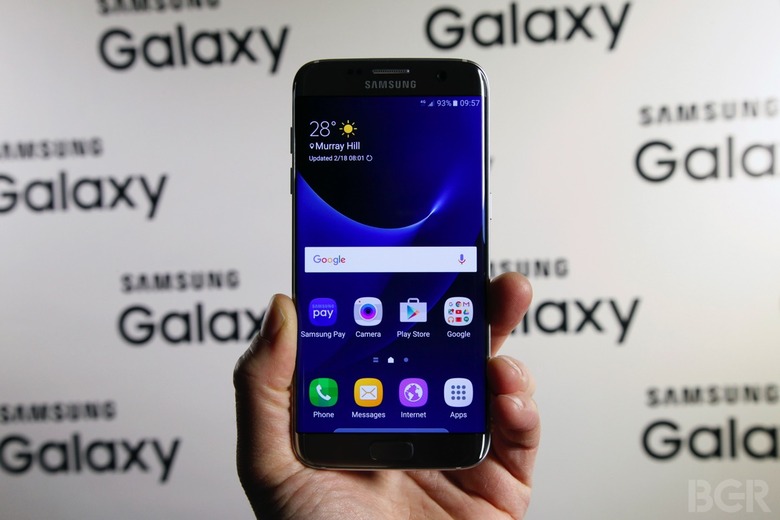I Really Tried, But There's Just No Way I Can Live With The Galaxy S7
Earlier this month I penned an article about the one thing preventing me from ditching my iPhone and switching to a Galaxy S7 edge. In my eyes, Samsung's latest flagship phone is as close as any company has come to the ideal physical smartphone experience given current technology limitations. The hardware is, hands down, the best that the world has ever seen. There's little doubt that Samsung's S6 and S7 designs took inspiration from Apple's iPhone lineup, but in my opinion Samsung managed to surpass Apple with the Galaxy S7 edge.
The large 5.5-inch display is a clear class leader, but the phone is still compact — it's barely wider than the 4.7-inch iPhone 6s. The glass and aluminum construction looks and feels amazing. The camera is, hands down, the best the world has ever seen on a smartphone. But the software is still Android even though it's hiding beneath TouchWiz, and I explained in my piece that it simply doesn't afford a user experience that can approach iOS.
Needless to say, readers gave me an earful after I published that article.
MUST SEE: Did you know Amazon had a special store just for cool new tech you've never heard of?
I received quite a bit of feedback via email regarding that post. Sure, some of it was from angry Android fans who felt compelled to complain, but most of it was actually quite levelheaded and constructive. I had a few good conversations with people and a common concern was voiced: I hadn't given Android enough time.
It seems odd to write that considering the fact that I've been using Google's mobile OS in some capacity since the first Android phone launched back in 2008. In fact, I've probably been using Android longer than any of the readers with whom I was corresponding. But even back in 2008, Android was never my main mobile platform — it always played second or even third fiddle to Symbian, BlackBerry or iOS.
When I review Android phones, I always dive in. But even while I'm reviewing a device it's not my main smartphone. So, I decided to take the advice of several readers who emailed me and use the Galaxy S7 edge as my main smartphone for a week.
It didn't change my mind.
Now, I couldn't completely ditch my iPhone during that week because that would mean I would've also had to abandon my Apple Watch. I also use iMessage almost exclusively to message friends and family. So I continued to carry my iPhone and to use it for messaging, but I did everything else on the S7 edge.
Because I have written a number of times that iOS offers the better user experience, many people take that to mean that I dislike Android. Quite the contrary, the reality is that I like Android a great deal. I think that what Google has done with its mobile operating system is masterful. The strategy was brilliant, and it worked even better than Google likely ever imagined: Android is everywhere.
Android is also a wonderfully capable and versatile platform with a massive ecosystem that surrounds it. If you can imagine it, odds are good there's an Android app that can do it. But the experience Android provides, and the experiences those apps provide, just isn't on the same level as the iPhone.
It's a bit difficult to fully grasp unless you've spent a fair amount of time comparing the two platforms side by side, but there is an attention to detail and a level of craftsmanship in iOS that simply isn't equalled in Android. It's all the little things that might seem minor on the surface, but that combine to separate the two.
Here's an example: in iOS, scrolling and swiping looks and feels natural. When you flick up in your Twitter timeline or in an email, the physics is perfect. The speed appears as though it matches your flick exactly, and the deceleration is smooth and steady until the motion slows to a halt.
The same flick on the Galaxy S7 edge's display sends the screen flying, and deceleration happens in bizarre, unnatural stages that are too easily perceptible. It's like walking down the stairs instead of gliding smoothly on an escalator. The same idea can be applied to a number of different areas of the UI — there are jitters abound, and if you really stop to pay attention, no animations are as smooth or as natural as they should be.
And when we come to apps, it's more of the same but the problems are even more apparent because you're introducing yet another cook in the kitchen. There's no consistency and even apps from top developers are often janky as you navigate them. Design is a matter of taste, I suppose, but it's absolutely insane and inexcusable that apps running on the most powerful Android phone on the planet stutter and stammer.
Let me be clear: With the Galaxy S7 edge, Samsung has created the best smartphone the world has ever seen. But the company is still operating within the confines of Android — by necessity at this point — and Android simply doesn't compare to iOS in several key areas of the user experience.
Is Android better than iOS in some ways? Absolutely. It's flexible, it's everywhere, and Google's services are fantastic. But the apps aren't anywhere near as polished and the experience overall isn't as clean or cohesive.
The iPhone is simply in a different league, and using the Galaxy S7 edge as my main phone for a period of time reminded me of how apparent the difference truly is.
